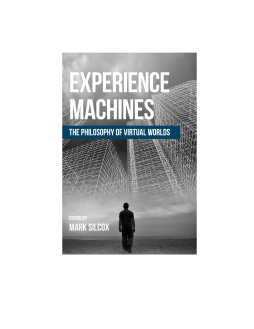
Additional Information
Book Details
Abstract
In his classic work Anarchy, State and Utopia, Robert Nozick asked his readers to imagine being permanently plugged into a 'machine that would give you any experience you desired'. He speculated that, in spite of the many obvious attractions of such a prospect, most people would choose against passing the rest of their lives under the influence of this type of invention. Nozick thought (and many have since agreed) that this simple thought experiment had profound implications for how we think about ethics, political justice, and the significance of technology in our everyday lives.
Nozick’s argument was made in 1974, about a decade before the personal computer revolution in Europe and North America. Since then, opportunities for the citizens of industrialized societies to experience virtual worlds and simulated environments have multiplied to an extent that no philosopher could have predicted. The authors in this volume re-evaluate the merits of Nozick’s argument, and use it as a jumping–off point for the philosophical examination of subsequent developments in culture and technology, including a variety of experience-altering cybernetic technologies such as computer games, social media networks, HCI devices, and neuro-prostheses.
Experience Machines is an exciting introduction to the philosophy of virtual worlds. But it is also an exciting introduction to philosophy in general. Experience Machines explores topics ranging from the ethics of creating virtual worlds to the value of virtual friendships. Through these specific, technologically modern topics, readers are introduced to issues that have occupied philosophers throughout the ages.
Dustin Locke, Associate Professor of Philosophy, Claremont McKenna College
As someone who cannot resist the siren-like allure of Facebook, this book compelled me to ask, among other things, whether the platform of Facebook is capable of nurturing genuine friendships, or simply providing a mere experience to that effect. Given the fact that virtual reality is still in its infancy, similar questions are bound to multiply for many aspects of our society. This book is a welcome start.
Eleni Panagiotarakou, Lecturer of Philosophy and Political Science, Concordia University
Mark Silcox is Professor of Philosophy at the University of Central Oklahoma. He is co-author of Philosophy through Video Games (2008), co-editor of Dungeons & Dragons and Philosophy: Raiding the Temple of Wisdom (2012), and author of several works of science fiction. He is a regular contributor to the philosophy blog Philosophical Percolations (www.philpercs.com) and President of the Southwestern Philosophical Society.
Are virtual experiences real or worthless? Is doing things in virtual worlds a legitimate way to conduct a human life, or just wasted effort? Are virtual friendships genuine forms of connection, or are they just an empty simulacra of the real thing? This volume addresses these crucial questions head on, and it does so with considerable depth and care.
C. Thi Nguyen, Assistant Professor of Philosophy, Utah Valley University
Table of Contents
| Section Title | Page | Action | Price |
|---|---|---|---|
| Contents | 7 | ||
| Introduction: The Experience Machine | 9 | ||
| Part I: Virtual Experiences and Human Well-Being | 19 | ||
| 1 Cypher’s Choices | 21 | ||
| 2 Intuition and Imaginative Failure | 41 | ||
| 3 Give Me the Confidence | 51 | ||
| 4 Ceci n’est pas une cuve | 65 | ||
| Part II: Real-World Experience Machines? | 81 | ||
| 5 Virtual Reality and “Knowing What It’s Like” | 83 | ||
| 6 Figuring Out Who Your Real Friends Are | 95 | ||
| 7 Welcome to the Achievement Machine: Or, How to Value and Enjoy Pointless Things | 107 | ||
| 8 Virtual Weltschmerz | 121 | ||
| Part III: Experiential Design: Problems and Prospects | 143 | ||
| 9 The Problem of Evil in Virtual Worlds | 145 | ||
| 10 Epistemic Lives and Knowing in Virtual Worlds | 163 | ||
| 11 Digital Tears Fell from Her Virtual Eyes: Or, the Ethics of Virtual Beings | 177 | ||
| 12 The Morality of Experience Machines for Palliative and End-of-Life Care | 191 | ||
| 13 The Experience Machine and the End of the World (As We Know It) | 211 | ||
| Bibliography | 227 | ||
| Index | 239 | ||
| About the Authors | 241 |
